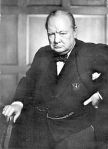Years ago, when I had just been told I had something called “depression,” I was having a tough time accepting it – after all, I was a litigator, a good-slinger extraordinaire. The only thing that I thought could bring me down was a lucky pistol shot at High Noon.
During a talk with my therapist in the beginning of my recovery a decade ago, I told him all the negative thoughts I was having about my life. My counselor, a large, white -bearded older man with an Obi Wan Kenobi-like aura, gently told me, “Dan that is depression talking.” Somehow that got through to me; somehow I knew it was true.
My counselor, pillar of Jedi knowledge that he was, had helped me look through a sort of psychic telescope into the constellation that was my patterns of depressive thinking. All people who have struggled with depression must do combat with their negative thoughts. They must – usually with a therapist’s help – begin to see that THEY are thinking these thoughts and they’re not just HAPPENING to them.
Negative Thoughts – and Lots of Them
It has been estimated that we have anywhere from 25,000 to 50,000 thoughts a day. If your ideas about life are predominantly downbeat, imagine how many negative thoughts you are generating daily—thousands upon thousands.
In the magazine Psychology Today, Hara Estroff Marano writes:
“One of the features of depression is pessimistic thinking. The negative thinking is actually the depression speaking. It’s what depression sounds like. Depression in fact manifests in negative thinking before it creates negative affect. Most depressed people are not aware that the despair and hopelessness they feel are flowing from their negative thoughts. Thoughts are mistakenly seen as privileged, occupying a rarefied territory, immune to being affected by mood and feelings, and therefore representing some immutable truth.
Compounding the matter is that negative thinking slips into the brain under the radar of conscious awareness and becomes one of the strongest of habit patterns. People generate negative thoughts so automatically they are unaware that it is happening; that it is actually a choice they are making.”
Lawyers are particularly prone to this type of pessimistic thinking which helps explain why their rates of depression are about twice that – twenty percent – of the general population.
In recent article in The Wall Street Journal wrote about this very topic:
“Martin E. P. Seligman, a psychologist and proponent of ‘positive psychology,’ observes that lawyers experience depression at rates that are 3.6 times as high as that of other employed people. They also abuse alcohol and illegal drugs at rates above what’s seen in non-lawyers. Why is this? In part, he says, the law selects people with a glass-half-empty attitude. His research has found that people who score low on an optimism test do better in law school. ‘Pessimism, he writes, ‘is seen as a plus among lawyers, because seeing troubles as pervasive and permanent is a component of what the law profession deems prudence.
A prudent perspective enables a good lawyer to see every conceivable snare and catastrophe that might occur in any transaction. The ability to anticipate the whole range of problems and betrayals that non-lawyers are blind to is highly adaptive for the practicing lawyer who can, by so doing, help his clients defend against these far-fetched eventualities. If you don’t have this prudence to begin with, law school will seek to teach it to you. Unfortunately, though, a trait that makes you good at your profession does not always make you a happy human being’’.
The Big Ten
For us to start making different choices about what kind of thoughts we think, it’s important to see the patterns, the way these false thought patters take place over and over again. Here are some examples of depressive thinking:
1. False extremes – “the tendency to evaluate [one’s own] personal qualities in extreme, black-and-white categories; shades of gray do not exist.”
2. False generalization – “after experiencing one unpleasant event, we conclude that the same thing will happen to us again and again.”
3. False filter – “we tend to pick out the negative in every situation and think about it alone, to the exclusion of everything else.”
4. False transformation – “we transform neutral or positive experiences into negative ones.”
5. False mind-reading – “we may think we can tell what someone is thinking about us, that the person hates us or views us as stupid. But such negative conclusions usually are not supported by the facts.”
6. False fortune-telling – “we expect catastrophe and the expectation itself produces hopelessness and helplessness.”
7. False lens – “we view our fears, errors, or mistakes through a magnifying glass and deduce catastrophic consequences. Everything then is out of proportion.”
8. False feelings-based reasoning – depressed persons “tend to take their emotions as the truth. They let their feelings determine the facts.”
9. False “shoulds” – “Our lives may be dominated by ‘shoulds’ or ‘oughts,’ applied to ourselves or others. This heaps pressure on us and others to reach unattainable standards.”
10. False responsibility – “when we assume responsibility and blame ourselves for a negative outcome, even when there is no basis for this.”
A common theme running through much of this type of thinking is a self-judgment of inadequacy and, as a result, the depressed person notices negative, misfortunate circumstances but ignores positive, fortunate circumstances.
Overachievers and perfectionist that they are, depressed lawyers may frequently receive positive feedback concerning his or her performance at work. For example, a depressed lawyer may have a caseload of one hundred cases. He might have the upper hand on 90%, but struggles with the 10%. This lawyer sees his struggle with the handful of cases as confirming what a loser he or she is, incompetent and unable to keep up “like everyone else.” The many positive comments made by colleagues or staff are not even remembered.
Because of the belief that he or she is inadequate, and his or her tendency to only notice negative experiences, the future is viewed as certain to be gloomy, dismal, and painful: “I’ll never make partner,” “I suck as a lawyer.”
Negative thinking sounds, to the outside observer, to be obviously false or negatively skewed. If so, just why do depressives repeatedly think like this over and over again? Are they idiots?
No, it’s because depressive thinking is “automatic.” It is not the result of thinking the situation through objectively – ironically enough, something lawyers are trained to do.
It just happens rapidly without any reflection.
So it’s the event itself that is sad, not life in general. And even if this thought or feeling arises, it is only temporary.
Depressive thinking leads to depression, leads to depressive thinking, leads to. . .
As we explain these thinking styles you will see how each helps to maintain depression, by altering how we perceive reality.
It’s these thinking styles that make it so hard to see an end to the depression, as they limit our possibilities of thought. Once these patterns take hold, the emotional arousal they cause begins to affect us physically.
If you are thinking now “Yeah, but you don’t know my life” – remember: there is nothing so awful that you can imagine that someone somewhere hasn’t survived without becoming depressed.
It is not your fault if you are depressed, but there are concrete, effective things you can do about it.
How to Kick Negative Thinking’s Butt
Again, Estroff Marrano offers some ways to combat negative thoughts:
- Distract yourself. Engaging, pleasant activities, such as exercise or hanging out with friends, are best. Once you are feeling more positive, you will be better able to solve problems.
- Stop that train of thought. Think or even tell yourself “Stop!” or “No!” when you start to ruminate.
- Write it down. Tracking your ruminative thoughts in a journal can help you overcome depression by organizing those thoughts and relieving yourself of their burden.
- Solve a problem. Even taking a small step toward solving one problem that is weighing you down will help with overcoming depression. Data show a strong link between goals you cannot achieve and depression-inducing ruminative thinking, so start problem solving.
- Identify triggers. Figure out which places, times, situations, or people are most likely to cause a bout of rumination, and find ways to avoid those triggers or manage them better. Mornings and evenings are the times when ruminative thinking is most likely.
- Meditate. Mindfulness techniques can help you get some distance from the thoughts that trouble you, while at the same time reducing stress.
- Stop linking small goals to big goals. For example, you may need to challenge a belief that achieving big goals (such as happiness) completely depends on succeeding at smaller goals (such as losing five pounds).
- Get therapy. Seek cognitive therapy techniques to help you question your thoughts and find alternative ways of viewing your situation.
Try, day by day, to chip away at the conclusion that depression just happens to you, or that it’s just a disease. Try to remember, that whatever it’s causes, negative thinking is a powerful fuel to help it arise and keep it going. Think about it.






















